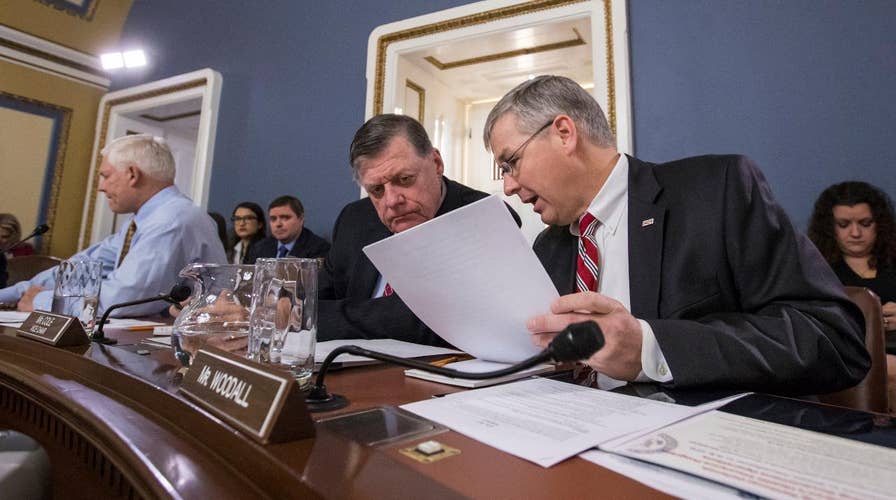House preparing a spending bill to avoid a shutdown
Republicans are trying to fund the government for a month.
WASHINGTON -- House Republicans early Thursday unveiled a new, stripped-down spending bill to prevent a government shutdown this weekend and allow quarreling lawmakers to punt most of their unfinished business into the new year.
The bill would keep the government operating through Jan. 19 and permit lawmakers -- Republicans and Democrats -- to head home for the holidays. It would delay battles over the budget, health care and immigration into January, denying Democrats wins that they had hoped to score this year.
Failure to pass the measure would trigger a government shutdown at midnight Friday, which would amount to a political pratfall just after the GOP scored a major win on a landmark tax bill. With Republicans controlling Washington, they would not have anyone else to blame for a shutdown debacle.
And yet President Donald Trump still tried to blame Democrats while winning over the frustrated House GOP factions.
"House Democrats want a SHUTDOWN for the holidays in order to distract from the very popular, just passed, Tax Cuts. House Republicans, don't let this happen. Pass the C.R. TODAY and keep our Government OPEN!" Trump tweeted.
The problem for GOP leaders is the party's defense hawks, who had hoped to enact record budget increases for the military this year. The short-term spending bill does contain about $5 billion to upgrade missile defense to respond to the threat from North Korea and to repair two destroyers damaged in accidents this year in the Pacific.
A vote is likely Thursday and Senate passage is expected to quickly follow.
Underscoring the inability of Congress to complete its work was the failure to reauthorize the health care program for some 9 million low-income children. The program expired on Oct. 1 and the spending bill only includes a temporary spending fix until March.
The House may also vote on an $81 billion disaster aid package that's a priority of the Texas and Florida delegations, but its fate is uncertain as conservatives upset about its cost may oppose the measure. The Senate would likely add money and pass it next year.
Congress also is expected to temporarily extend an expiring overseas wiretapping program aimed at tracking terrorists. It has bipartisan backing, but conservatives and some liberals oppose it.
Thursday's version of the spending bill is the third rewrite this week as GOP leaders have struggled to come up with a plan that would unite Republicans. Democratic leaders aren't providing votes to pass the measure, saying Republicans are ignoring promises to protect young immigrants brought to the country illegally as children. That issue, along with a hoped-for budget deal to undo a spending freeze on both the Pentagon and government agencies, would be put off until January.
House Democratic Leader Nancy Pelosi of California made a rare appearance before the Rules Committee to press for a vote on legislation dubbed the Dream Act, which would provide a pathway to citizenship for the immigrants.
An earlier shutdown-prevention plan favored by pro-Pentagon members of the influential Armed Services Committee would have combined the stopgap funding bill with a $658 billion Pentagon funding measure. But the idea is a nonstarter with the Senate, especially powerful Minority Leader Chuck Schumer, D-N.Y.
"The number of options is collapsing down," said Rep. Frank Lucas, R-Okla. "I have faith that at the last possible moment, to paraphrase Churchill, when we have no other choice, we'll do what we need to do."
The bill includes a short-term, $2.1 billion fix for an expiring program that pays for veterans to seek care outside the Department of Veterans Affairs system. It also includes a patch through March to ensure states facing shortfalls from the Children's Health Insurance Program won't have to purge children from the program.
The legislation also has a provision to turn off automatic cuts to many "mandatory" spending programs, including Medicare, that would be triggered by the $1.5 trillion tax cut bill.
Regardless of how the crisis of the moment will be solved, most of the many items on Capitol Hill's list of unfinished business are going to be pushed into next year.
Hopes for a bipartisan budget deal to sharply increase spending for the Pentagon and government agencies appeared dead for the year and Democrats were rebuffed in their demands for protections for young immigrants brought to the U.S. illegally as children. There's significant bipartisan sympathy for these immigrants, but battles over GOP demands for Trump's border wall and additional funding for immigration agents are proving difficult to resolve.
On Wednesday, Sens. Lamar Alexander, R-Tenn., and Susan Collins, R-Maine, announced they would not seek to add the insurance subsidies, which are designed to stabilize the Affordable Care Act's markets. The tax bill repeals the requirement that individuals purchase insurance.
Trying to combine the health measure with the spending bill was a demand of Collins when Trump and Senate GOP leaders secured her vote for the party's tax cut measure. But House conservatives strongly opposed the move.
House Republicans weren't part of that deal, and with the tax vote over, it became plain that Senate leaders were not able to deliver for her.













































